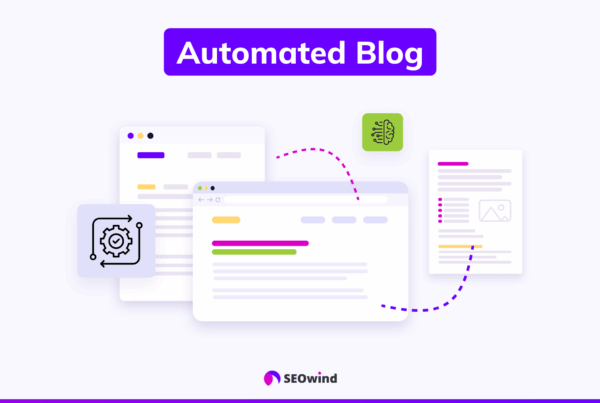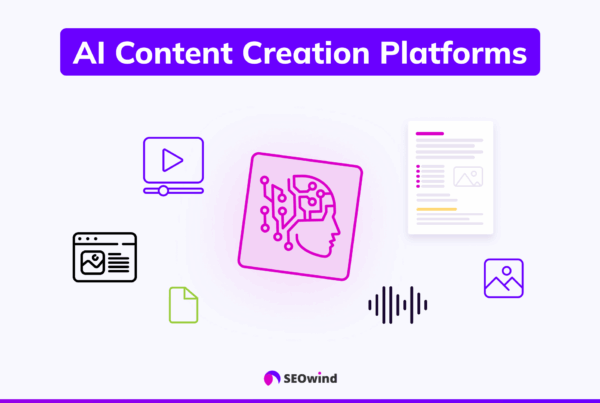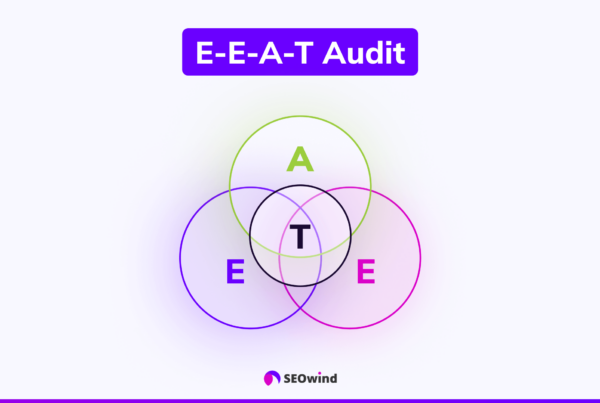Have you ever imagined looking into a crystal ball to get clear insights about your website’s ranking on search engines and take some burden off those strenuous SEO strategy brainstorming sessions? Well, welcome to the future. Brace yourself as we untangle this complex yet exciting chapter in digital marketing: AI-powered SEO.
What is AI for SEO?
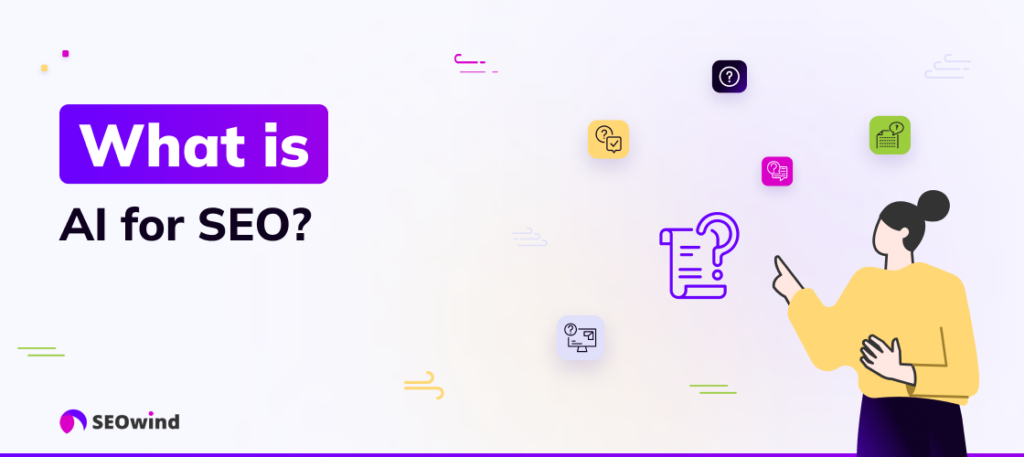
Let’s start by breaking down the terms. SEO stands for Search Engine Optimization, which involves increasing a website’s visibility to search engines to achieve higher organic rankings and more quality traffic.
On the other hand, AI, or Artificial Intelligence, signifies an advanced technology capable of performing tasks that ordinarily require human Intelligence. Such duties might include learning from experience, recognizing patterns, understanding natural language, and making decisions.
When we combine these two concepts as “AI for SEO,” we’re talking about employing Artificial Intelligence for search engine optimization. Specifically, AI in SEO uses intelligent automation machines to augment or replace monotonous manual tasks.
AI can carry out numerous progressive actions autonomously. This includes identifying content gaps on your webpage, determining how users interact with content, analyzing complex data sets in microseconds to reveal hidden trends, recognizing spammy backlink profiles detrimental to your site’s authority, and so much more.
Thus, Artificial Intelligence in SEO streamlines and elevates many elements of digital marketing strategy, driving notable results through efficient and effective tactics. For any brand aiming to leverage the ever-growing volume of online data, using AI for SEO may present strategic advantages and should be embraced where possible.
Can AI do SEO?
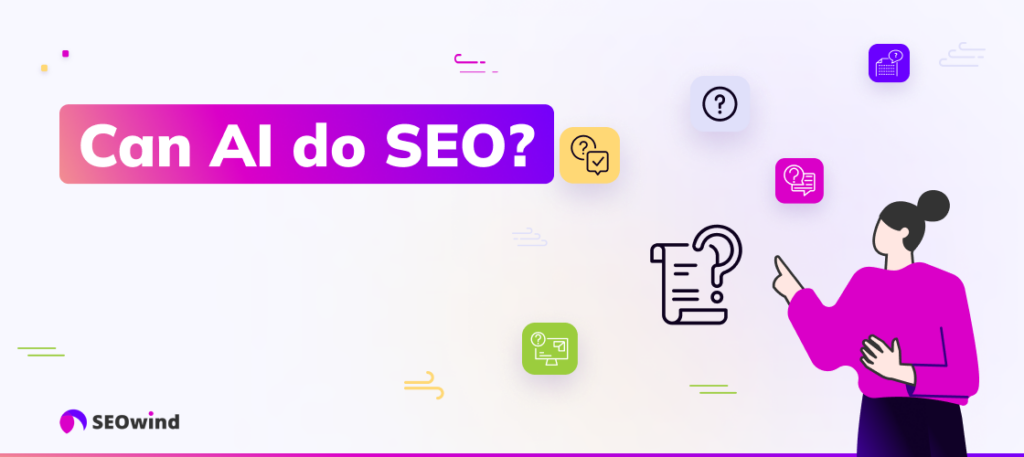
With the ever-improving state of technology, people often ask whether AI can do SEO. The answer is an emphatic yes! Artificial Intelligence (AI) has made significant strides in various fields, and Search Engine Optimization (SEO) is one of them. The marriage between AI and SEO opens doors to numerous possibilities that drastically improve search engine rankings.
AI for SEO: From Futuristic Concept to Reality
A few years back, leveraging Artificial Intelligence for SEO was a futuristic concept primarily found in science fiction. However, it’s becoming increasingly common as digital marketers get their hands on next-generation AI tools for SEO. These technologies are far more sophisticated than traditional methods and assist with tasks such as content optimization, technical audits, keyword analysis, user experience evaluation, and even automation of certain manual processes.
How AI is Revolutionizing SEO
Let’s look at some ways AI excels in performing SEO tasks:
- Deep Learning: By employing intricate algorithms to understand user behavior better.
- Machine Learning: Enables prediction of user preferences based on historical data.
- Semantic Analysis: Detects patterns within content to generate the best results.
- Predictive Analysis: Makes proficient use of existing data to forecast future trends.
The fusion of AI-powered SEO transcends the capabilities of standard website optimization practices, offering predictive analyses and automated decision-making, which would otherwise take days or weeks using conventional means.
Navigating AI-Driven SEO Strategies
Understandably, implementing an entirely AI-driven strategy might seem daunting initially, especially without explicit knowledge about when or how Artificial Intelligence integrates with your existing processes. But fear not! This guide provides a detailed breakdown describing exactly what you need to start reaping the benefits of AI for SEO optimization.
Artificial Intelligence in SEO is becoming commonplace, and taking advantage of these futuristic technologies will soon no longer be optional for businesses wishing to stay competitive online. Indeed, using AI for SEO has become a game-changer in the digital marketing landscape. It’s time we fully embrace this technology and harness its true potential to dominate the rankings like never before!
Benefits of Merging AI and SEO
AI SEO offers a wealth of benefits for website ranking. In this rapidly advancing digital world where competitiveness reigns supreme, utilizing the power of Artificial Intelligence to optimize your Search Engine Optimization (SEO) strategy can result in significant leaps forward.
First, recognize how incredibly potent AI SEO is when understanding user behavior. With its remarkable machine learning capabilities, AI can brilliantly analyze and predict trends based on users’ past behaviors. This provides precise insights, allowing strategies to be tailored to address your audience’s needs and wants.
Another compelling benefit lies in how efficient it makes keyword analysis. Traditional methods could have you trawling through data for hours, while an AI SEO tool executes this process with superior speed and precision. It identifies high-ranking keywords related to your content that you may have yet to consider.
In addition to efficiency, there’s also the question of accuracy, which is where AI truly shines. Eradicating human error is a considerable advantage that shouldn’t be brushed under the rug. By ensuring data analysis is accurate and reliable, on-page AI helps foster trust among customers and clients.
The prowess of AI for SEO optimization also extends to its ability to proactively identify potential issues on your website and suggest necessary fixes before they become real obstacles. Be it broken links or pages that load slowly, AI SEO quickly catches these technical glitches.
Finally, using AI for SEO amplifies Return On Investment (ROI). The increased precision, relevance, and accessibility delivered by intelligent optimization strategies drive more significant organic traffic, bolster lead generation, and improve conversion rates.
In light of the above points, it becomes abundantly clear how consequential adopting Artificial Intelligence for SEO can be for your digital strategy. The benefits you stand to gain from this innovative approach can act as a springboard for your website’s ranking success, giving it the edge it needs within today’s highly competitive digital landscape.
How AI SEO Works
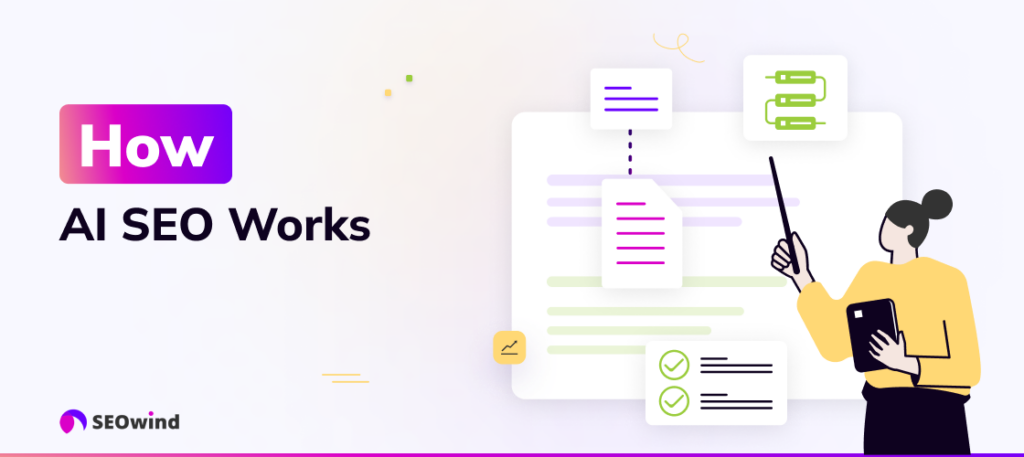
Navigating the intricate landscape of Search Engine Optimization is daunting for any content creator. It’s essential to understand how AI works in harnessing SEO. Therein lies the crux of our discussion: the workings of AI-driven SEO or ‘AI SEO.’
Interestingly, every time you use one of your preferred search engines, such as Google or Bing, and input a query, an intricate matrix drives that seemingly simple action. The algorithm processing your digital request doesn’t just fetch random web pages related to your query. It uses advanced technology akin to what we colloquially call Artificial Intelligence to provide precise and relevant responses.
On a fundamental level, two distinct steps underpin how AI optimizes SEO.
Step 1: Data Collection
AI employs intelligent bots known as “crawlers” or “spiders” that scour through infinite amounts of website content. These spiders harvest valuable data, including keywords used, website structure, backlinks, site performance parameters, and user behavior metrics. The efficiency inherent to these robots enables new levels of knowledge collection, forming an expansive repository. This is, quite simply, impossible for humans to do alone.
Step 2: Data Analysis and Decision Making
This is the stage where raw data are turned into insights pertinent to decision-making. The results of this process include identifying trending keywords necessary for AI SEO content writing.
Machine Learning algorithms imbibe attributes from previous search data, identifying patterns by actively learning from every new piece of information. This iterative learning eventually enhances prediction accuracy, ensuring users land on websites with content that matches their queries exactly.
Implementing AI in SEO unlocks comprehensive multi-dimensionality projected through layered applications, key amongst them being Natural Language Processing, Machine Learning, and Data Analysis and Visualization.
In short, AI SEO is a dedicated process that fetches, analyzes, learns, and improves search engine results page (SERP) rankings. Recognizing the impact of AI-powered SEO has significant implications for directing future trends in digital marketing and website strategy planning. After all, unlocking the power of AI for SEO optimization isn’t just about staying updated; it’s also about expanding horizons.
Key Components of AI SEO
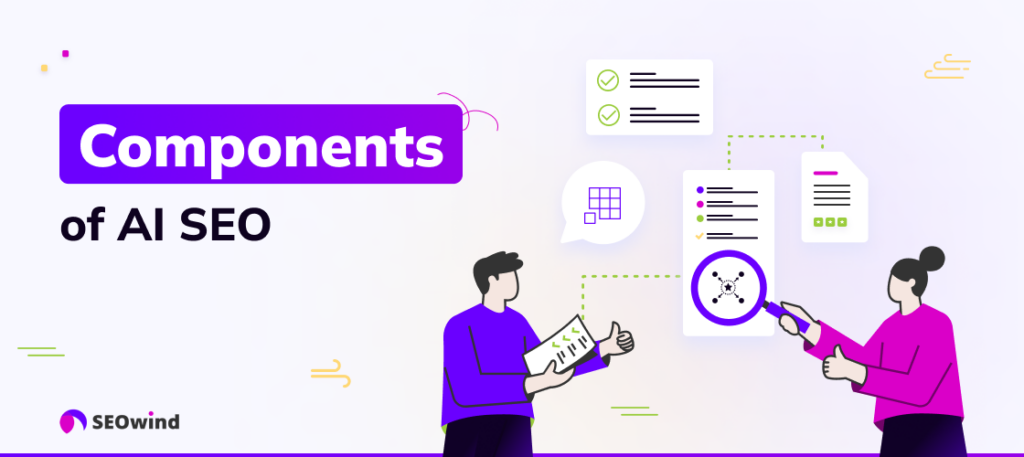
Navigating the terrain of Artificial Intelligence for SEO can be an intimidating proposition without understanding those essential components that allow it to function effectively. Delving into these elements creates a clearer picture of how AI performs search engine optimization and helps us comprehend how this technology redefines how we see website rankings.
Natural Language Processing (NLP)
The first key component of AI SEO is Natural Language Processing (NLP). The importance of this technology in the context of SEO cannot be understated.
NLP is an area of AI that aids computers in understanding and interpreting human language as naturally as humans do. It processes written text, discerning meaning, nuances, sentiment, and context. In fact, Google’s very own BERT algorithm uses NLP to comprehend complexities within user queries better.
Expanding the effectiveness of keywords beyond mere semantic understanding can help boost your content significantly on SERPs. Therefore, using AI tools that employ NLP capabilities for SEO should be a top priority.
Machine Learning (ML)
Have you ever wondered how Google knows precisely what you are after with just a few keystrokes? This impressive functionality isn’t magic. It falls under another critical section: Machine Learning (ML), which imparts systems the ability to learn from data and automatically improve from experiences. For instance, if users often select high-end products from various price range options, algorithms will gather this information over time, presenting them with more upscale alternatives in future searches thanks to machine learning-powered AI SEO content writing strategies.
Data Analysis and Visualization
Lastly comes data analysis and visualization. While these may sound dryer than machine learning or natural language processing, they hold immense importance within AI SEO.
Simply collecting information is of little value without proper understanding and representation of that data. Thankfully, numerous Artificial Intelligence for SEO tools offer users detailed analysis and creative visualization options that enable better comprehension, quicker decisions, and more strategic planning.
Survival in the dynamic world of search engine optimization today relies heavily on these three pillars: Natural Language Processing (NLP), Machine Learning (ML), and Data Analysis and Visualization. Together, they form a holistic approach to AI-powered SEO optimization as you gear your websites to rank better and gain higher visibility in this crowded digital space.
AI SEO Tools and Platforms
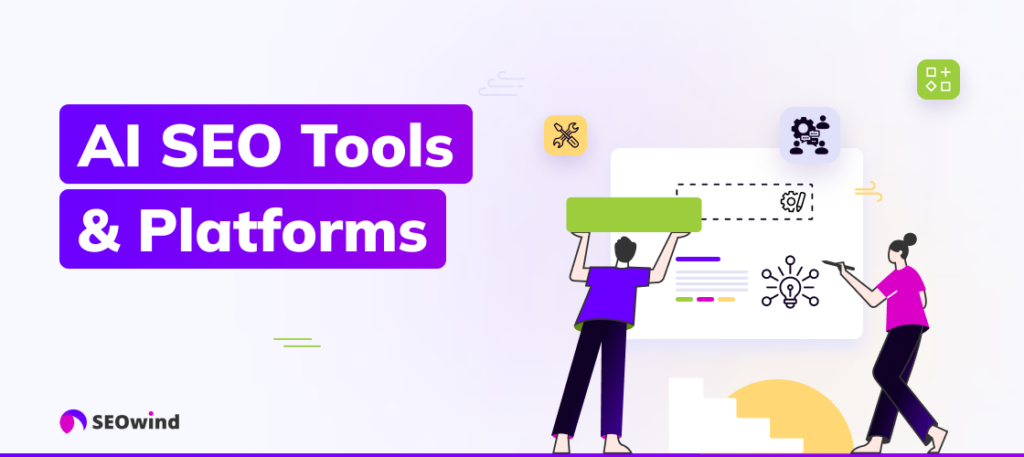
Investing in powerful AI SEO tools can be game-changing for any business. They leverage advanced technologies such as Artificial Intelligence and machine learning to expedite the labor-intensive tasks of SEO tactics, saving time and improving outcomes. Here are some fundamental tools you should have on your radar.
SEOwind
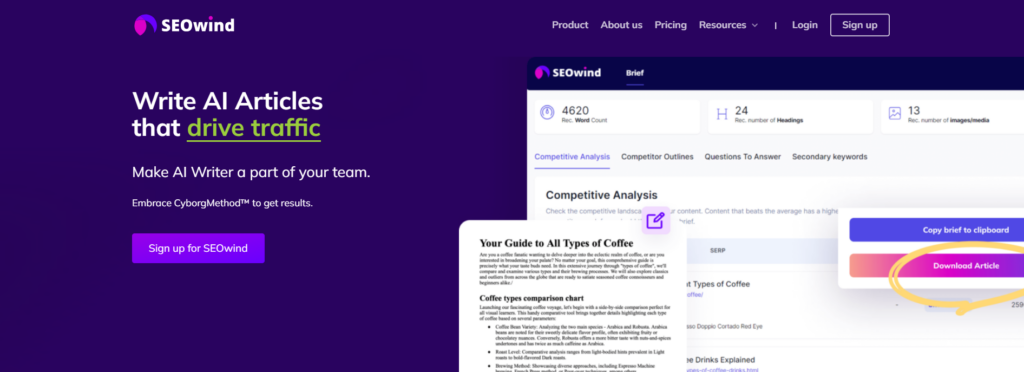
SEOwind is a high-ranking AI SEO tool laced with Artificial Intelligence algorithms. This platform leverages many data points to provide insights when creating SEO-optimized long-form content. It gives you information about top-performing content regarding its title, meta description, keywords, and structure. This way, you know how to craft your next AI article or blog post to make it better and perform in Google.
Moreover, it provides insights into user queries to understand their search intent better.
Jasper
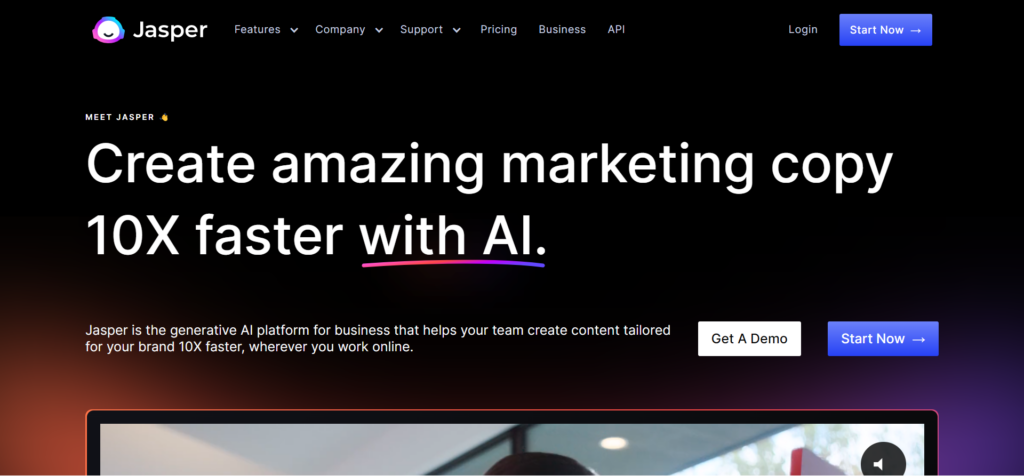
Next is Jasper, widely esteemed for its well-rounded features encompassing AI SEO content writing and keyword research. With an intimate understanding of Google’s ranking algorithm, Jasper provides invaluable navigation through the murky waters of content curation for optimal results.
Jasper uses natural language processing to grasp context, sentiment, and topical relevancy within your industry ecosystem. This understanding fosters impressive content strategies anchored in specific user queries and interests rather than conventional keywords, creating a more organic connection between search intent and served content.
Drawing from its prowess in pattern identification thanks to Artificial Intelligence capabilities, the tool also guides you towards excellent traffic-driving opportunities based on emerging trends and divergences within your niche market sphere.
Frase
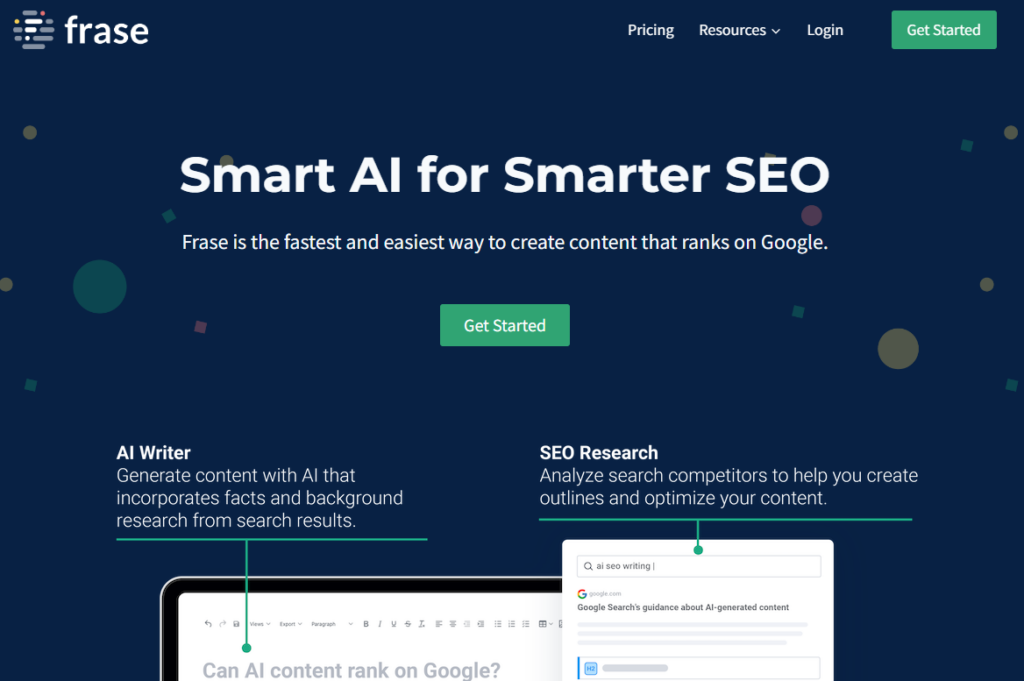
Frase holds a remarkable spot among AI-powered SEO tech-stack assets. This is due to its incredible ability to analyze SERP and build items that resonate well with Google’s BERT-era algorithms that appreciate deeper contextual relevancy bound directly to user questions.
Using Frase for AI SEO optimization ensures that your website meets the criteria search engines seek to earn high-value traffic. Moreover, its unique AI-question generation capability elegantly captures long-tail keywords. By doing so, Frase increases your potential to rank significantly via novel search queries.
Tuning into these tools and platforms goes beyond saving time on routine SEO tasks. It is a reliable stride towards strategically implementing refined tactics that work brilliantly amidst various Google algorithm updates and evolving user behavior patterns. They’re your tickets to successfully leveraging Artificial Intelligence for SEO now and in the future.
Using AI for SEO Content Creation
When we talk about using Artificial Intelligence (AI) in search engine optimization (SEO), we’re diving into a fascinating vortex where cutting-edge technology meets the dynamic world of internet content. Creating top-notch, optimized content is now more accessible thanks to AI SEO content writing tools.
The process that requires intense brainstorming, creative prowess, and foundational expertise can be made more accessible by leveraging AI-powered SEO. How exactly? Let’s dive into it.
The first point to reflect on is how AI helps create audience-centric content. If your written material doesn’t resonate with your target market or meet their needs, you’ll struggle to rank high on Search Engine Result Pages (SERPs). That’s where AI steps in! By fetching data from multiple online consumer touchpoints and extensively analyzing current trends, an AI SEO tool can help identify what interests your ideal customers at any given time.
Moreover, semantic analysis has become an invaluable facet of our AI for SEO optimization toolkit. This incredible feature enables Artificial Intelligence to comprehend text contextually like humans. Consequently, AI helps guide writers to craft engaging messages while retaining keyword relevance.
Beyond shaping core content ideas and aiding writers in maintaining topic relevancy, Artificial Intelligence also offers predictive analysis assistance. This means steering away from guesswork regarding future industry-specific topics and directing your focus toward confirmed winners based on core metrics analysis.
Finally comes structuring, a vital component of compelling content creation often overlooked by many creators. With SEO Artificial Intelligence applications’ modern innovations, concerns around heading distribution and image-text ratio check-ups, among others, are expertly handled, saving time and effort while improving quality.
In essence:
- An AI for SEO tool aids in creating relatable and trending topic ideas.
- The semantic analysis boost given by Artificial Intelligence improves keyword strategy.
- Predictive assistance through data analysis and visualization eliminates guesswork in topic choices.
- AI helps in perfect post structuring for optimized content.
By weaving together these capabilities, AI SEO substantially streamlines the path to creating appealing, search-engine-optimized content. From determining relevant topics to optimizing text structure, using AI for SEO effectively pioneers the future of high-quality web content creation.
Isn’t it astonishing how far we’ve come to be able to mix technology with creativity? Think about your own experiences in this area. Can AI revolutionize SEO practices as we know them, particularly around content creation?
Using AI for SERP Research and Keyword Analysis
As an experienced content writer and a technology enthusiast, employing Artificial Intelligence for SEO optimization has access to exciting possibilities. Among them are SERPs (Search Engine Results Pages) research and keyword analysis. The utilization of AI in this area offers numerous benefits that are quite revolutionary.
AI SEO tools can scrutinize SERPs and conduct keyword analysis at a level humans can’t match. Using AI for SEO allows us to process extensive amounts of data swiftly, delivering insights faster than ever. This efficiency paves the way for making precise, data-driven decisions that eventually affect your rankings positively.
How does it work? Here’s what happens under the hood:
- SERP Analysis: AI tools for SEO sift through thousands of search engine results pages simultaneously with ease. They can classify website rankings according to different parameters like relevance, popularity, or user engagement metrics such as dwell time or click-through rates.
- Keyword Suggestion: While conducting research using conventional methods may help you generate a unique set of keywords, there’s only so much one can think of offhand. AI outshines our cognitive capabilities when generating countless targeted keyword suggestions.
- Competitor Insight: Data gleaned from these processes also offers insight into competitors’ strategies, allowing you to align your tactics accordingly.
What are the technologies behind these functionalities? Machine Learning is undoubtedly a core tool in your belt. Algorithmic models feed on historical data to develop comprehensive patterns and predict outcomes. So, they evolve over time, feeding on more data and giving superior results as they mature.
Next, we have Natural Language Processing (NLP), which enables AI-powered SEO tools to understand lexical semantics. As machines become more able to comprehend human language, they can provide ever-more-precious results.
In conclusion, using Artificial Intelligence in SEO, particularly for SERP research and keyword analysis, is an incredible game changer. It offers unprecedented efficiency and accuracy that humans can’t match, which ultimately contributes positively to your website’s rankings. AI SEO content writing has never been so insightful, and it will only get better. So why not give it a shot?
Using AI for Technical SEO
AI in SEO shines exceptionally bright when it comes to tackling technical elements. ‘Technical SEO’ refers to the procedures and configurations required to enhance search engine indexing and crawling. Including AI in SEO exponentially simplifies these complex tasks.
AI tools for SEO can perform a website audit, flagging potential issues like broken links and page load speed, which affect ranking algorithms. Using AI for SEO optimization is equivalent to having a meticulous quality controller monitoring your site continuously.
Importance of Page Load Time
In the bustling digital landscape, visitor patience is relatively short. A slow-loading webpage can make users click the ‘back’ button faster than you might imagine, damaging engagement rates and website ranking.
Here’s where AI-powered SEO proves essential! Artificial Intelligence makes quick calculations, swiftly identifying elements dragging your site down. Whether it’s an uncached script or an oversized image file, let AI help tease out the grooves and boost your site speeds!
Broken Links Identification and Correction
Dead-end web pages tend to create a poor user experience and hinder effective crawlability, which is an often overlooked aspect of Artificial Intelligence in SEO. However, manually checking every link becomes impractical as one’s business grows.
Dealing with broken links is less burdensome when employing AI SEO content writing techniques and technical assessment tools. Automated systems can detect such issues instantly and guide you toward practical solutions like redirecting users or removing redundant links.
Coding Improvements
Optimized code streamlines page loading times and enhances website interactions efficiently, a factor Google’s ranking algorithms love.
AI-powered audits sift through your web programming language to uncover redundancies, flag problematic script sections, and suggest coding modifications. This leaves your site sleeker and more compliant with SEO best practices.
Even if you’re not tech-savvy, including AI SEO tools in your digital toolkit can yield powerful results. They empower non-developers to approach and manage technical SEO, taking much of the guesswork out of maintaining a highly-ranked site. So, why not leverage Artificial Intelligence for SEO today for frictionless website tuning?
Using AI for Content Strategy Development
Developing a content strategy entails more than merely crafting valuable material. It means understanding the entire ecosystem in which your content resides. You need to know what to write, why you’re writing it, and who you’re writing for. In this context, ‘AI SEO’ functions as a game-changer.
The prominence of AI in SEO cannot be overstated. When utilized correctly, Artificial Intelligence for SEO can revolutionize your website’s rankings by aligning your strategy with ever-changing algorithms and user preferences. Among its multifaceted applications, one that stands out is using AI for SEO content strategy development.
The Power of Predictive Analysis
One remarkable feature of AI technology is predictive analysis. With algorithms capable of deciphering intricate patterns from historical data sets, creating calculated predictions around future behavior becomes possible, no matter whether you’re ranking algorithm changes or user browsing habits.
This kind of AI SEO optimization allows strategists to stay ahead of the curve, capitalizing on trends before they fully form and adjusting promptly to emerging signals from search engines.
Tailored Content Experiences
Another exciting aspect worth exploring when discussing AI tools for SEO is their potential to tailor content experiences. By recognizing patterns, AI can match specific consumer personas with appropriate types of content.
Creating personalized experiences can significantly enhance your content’s relevance and efficacy, bolster engagement levels, and ultimately elevate your rank on Search Engine Results Pages (SERPs).
Competitor Analysis Par Excellence
Implementing AI-powered SEO extends immense value when developing competitive insights. AI platforms like Jasper provide an edge through extensive competitor research capabilities that identify gaps in their strategies that you can take advantage of.
Using such advanced insights can help improve your positioning while weakening competitors’. Such a two-fold benefit makes considering SEO Artificial Intelligence part of your strategic arsenal worthwhile.
Integrating AI for SEO content strategy development can fine-tune your efforts, creating a domino effect of improved relevance, engagement, and visibility. The question is not whether to utilize this technology but how best to align it with overarching business goals. So, are you ready to ride the wave?
Using AI for Improving User Experience
A website’s user experience (UX) is no longer just about having aesthetic designs or easy navigation. It’s much broader and impinges significantly on SEO. Enter – AI, which has the potential to revolutionize the user experience entirely.
AI SEO optimization isn’t limited to ranking high on search engines. It also ensures that your users have an excellent time browsing your site. A notable way Artificial Intelligence in SEO achieves this is by personalizing experiences based on visitors’ behavior.
Typically, one of the primary goals of UX design is to reduce the bounce rate, which indicates that visitors stay longer on your site. However, if your content adjusts itself intelligently based on what each visitor prefers, they’ll likely spend more time interacting with your content.
AI-powered SEO enforces such personalized interactions via machine learning algorithms, which analyze countless data points, including visitors’ past behavior, location, or even time spent per visit. Afterward, these data-driven insights help shape the content strategy and induce better user engagement.
Another gem from our AI tools for SEO collection would be chatbots, AI’s go-to conversation simulator. It offers 24/7 customer service, handling repetitive queries swiftly while freeing human assistants to manage more complex tasks.
Here are a few key ways leveraging AI for SEO improvement could further enhance the user experience:
- Individualized Content Delivery: Depending on specific user demographics, preferences, and interaction histories.
- Improved Page Loading Speed: Dynamic change in web design elements according to individual device capabilities can drastically improve page load times.
- Yielding Accurate Search Results: Enhancing search functionality within a website with Natural Language Processing (NLP) can give users precise results, elevating their satisfaction levels.
When you use AI-powered AI SEO effectively and combine it with UX best practices, you render a seamless, all-encompassing user experience, increasing overall success metrics.
With proper AI SEO content writing and strategies in place, the sky’s the limit for improving a website’s user experience!
Using AI for Enhanced Website Functionality and Ease of Use
Artificial Intelligence (AI) is critical to enhancing website functionality and making its interface user-friendly. But how exactly does it accomplish this? Leveraging quality AI SEO tools and some core usability engineering principles can transform your web platform into an influential digital powerhouse. Let’s delve deeper into the specifics.
In a bid to enhance website functionality, AI primarily focuses on aspects such as site navigation, accessibility, speed optimization, and information architecture. Initiatives in these areas aim to simplify complex processes for users, thereby improving engagement across your site.
Site Navigation
By applying AI SEO techniques, simplifying site navigation could lead to increased user experience and satisfaction levels. Web crawlers use advanced ML algorithms (part of Artificial Intelligence) to understand better how users engage with a site’s structure and visual components. Insights from these interactions are utilized to improve navigational elements such as menus and calls-to-actions.
Accessibility
With recent advancements in Natural Language Processing (NLP), an integral part of AI-powered SEO is the commitment to designing websites that serve all users equally well, including those experiencing disabilities or limitations. A fundamental way NLP contributes is by creating platforms compatible with screen readers, which interpret page content vocally for visually impaired users.
Speed Optimization
Speed matters! And that’s one area where AI SEO optimization has had a profound impact. The analytical capabilities offered by AI enable data-driven assessment related to your site’s load time while identifying relevant improvements to fast-track loading periods.
Information Architecture
Rest assured, no stone is left unturned when using AI for SEO enhancement! The discipline concentrates strongly on information architecture – essentially the organization and categorization of on-page content—with proficient auditing capacities provided by an Artificial Intelligence-driven mechanism.
Using AI for SEO to enhance website functionality and usability is incredibly impactful! In the evolving digitized space, implementing this methodology could be a game-changer for your business. However, before delving into it head-first, you’ll need to acquaint yourself with essential tools that facilitate the automation and analysis necessary for this AI application. In the subsequent sections, I’ll walk you through some key examples that might come in handy on your journey toward optimization.
Using AI to Generate More Leads
In the busy digital sphere, where competition can be fierce, businesses must constantly find ways to optimize their online presence. One effective approach that’s been making a significant dent lately is using Artificial Intelligence (AI) for SEO optimization. However, it’s not just about being seen or getting website visitors; it’s also about converting them into profitable leads.
Bridging the Gap with Hyper-Personalization
On-page AI helps fulfill this responsibility by bridging the gap between raw data and meaningful engagement. It starts by understanding your audience better through predictive analysis and then providing hyper-personalized content and offers that resonate deeply with potential clients’ needs and wants.
Hyper-personalization means delivering tailored messages according to an individual visitor’s behavior, preferences, and demographics – something precious when generating more leads. Remember that people are usually more likely to interact with personalized content than a generic one.
Chatbots: Your 24/7 Lead Generation Assistants
AI-powered SEO isn’t limited solely to page content either. For example, consider AI chatbots as practical tools that help streamline lead generation round-the-clock without human intervention needed all the time.
Like personal assistants on auto-drive, these chatbots use machine learning algorithms to answer customer inquiries or gather necessary customer details instantly and accurately. This instant gratification contributes significantly toward motivating potential customers through lead generation funnels faster while maintaining a positive user experience.
Predictive Analysis: Forecast Your Next Move
Lastly, let’s delve into predictive analysis, a remarkable feature offered by advanced Artificial Intelligence for SEO operations to help generate higher-quality leads. The crux of this tech is its ability to analyze past behaviors and predict future tendencies among your target market segments.
Combining historical data with real-time trends allows businesses to craft laser-targeted marketing campaigns that resonate with high-intent consumers identified by AI systems. It enables companies to tap into a pool of potential customers who, with the right nudge, will likely convert.
Using AI for SEO maximizes your lead-generation efforts. As this technology gets more innovative and continues evolving, achieving sustainable growth in the digital realm becomes a foreseeable future rather than a distant possibility.
Best Practices for Implementing AI SEO
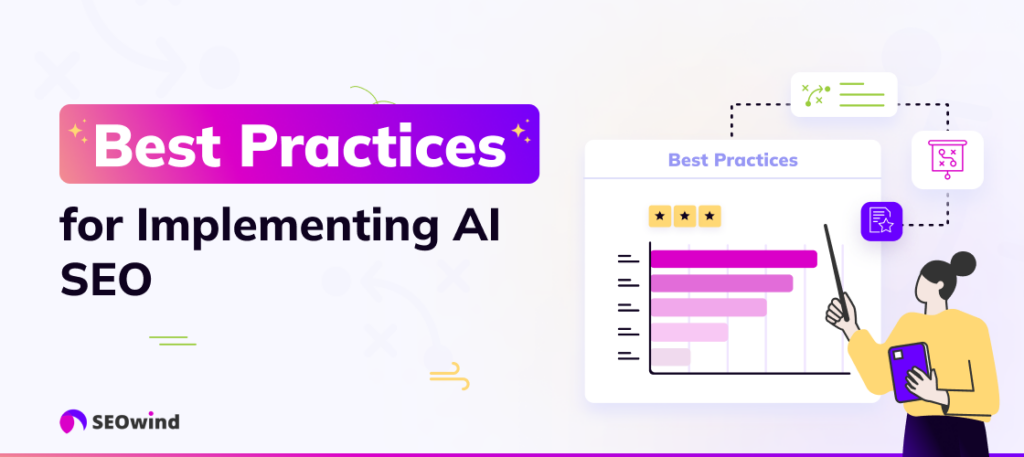
Harnessing the power of AI for SEO optimization can seem like an uphill battle, especially if you’re new to the concept. However, there are best practices that summarily guide the successful implementation of AI in your SEO strategy.
- Understand The Basics: Before incorporating Artificial Intelligence into your SEO, it’s crucial to understand the basics of both. Knowing how search engine algorithms rank content and appreciating the capacity of AI tools for SEO will help you set realistic goals and expectations.
- Choose The Right Tools: Numerous AI SEO tools are available in the digital marketplace, each offering different functionalities. When selecting a tool, consider its features against your specific needs, along with its ease of use and customer reviews.
- Utilize Natural Language Processing (NLP): One key discipline within the larger spectrum of AI is natural language processing, which has significant implications for on-page AI operations, such as creating conversational bots or generating user-friendly content.
- Apply Machine Learning Models: By employing machine learning models via Artificial Intelligence for SEO optimization, you’ll enable predictive analysis that aids adjustments before potential threats or opportunities arise.
- Embrace Data Analytics: For maximizing benefits from your AI-powered SEO strategy, ensure comprehensive utilization of data analytics capabilities offered by these cutting-edge tools– aiding tactical decisions such as keyword usage.
- Keep Abreast With Changes: The intricate relationship between AI and SEO continuously evolves alongside search engine algorithms. Remaining informed about updates ensures an optimized approach.
- Practice Patience: Like many other good things in life, a successful AI SEO integration takes time. It requires continuous experimentation, adjustments based on feedback, and, above all, patience for impactful results.
Through proper understanding and intelligent use of advanced technologies such as NLP and machine learning within chosen AI SEO toolsets, success isn’t far away. The modern landscape of search engine optimization is increasingly embracing the potency of Artificial Intelligence for SEO, paving the way forward with numerous opportunities to explore and benefit from. That’s what makes mastering these best practices a strategic and exciting venture into the future dynamics of SEO Artificial Intelligence!
What’s Your Experience with AI-Generated SEO Content?
Considering your journey in the digital marketing space, there’s a fair chance you’ve come into contact with Artificial Intelligence for SEO content. I know how intimidating it initially seems. It gave me several pause-and-think moments, too.
My early encounter with AI-generated SEO content was admittedly filled with skepticism. After all, how could software possibly replace the creative intellect of a human writer? As someone who prided myself on my ability to craft engaging and optimized content, I couldn’t fathom that AI could deliver the same level of detail or quality.
But as I dug deeper into using AI tools for SEO optimization and tried various AI-powered software, I discovered something interesting: Artificial Intelligence in SEO is not about replacing human input but enhancing it. It became evident that this technology doesn’t diminish our role as content creators but helps us draft better, more compelling content.
The distinctive use of natural language processing (NLP) and machine learning (ML) contributes to strong on-page SEO strategies that firm up website rankings, a game-changer for any writer hoping to compete in the saturated digital marketplace.
Today, I work hand-in-hand with AI for SEO optimization and guidance. With its help in navigating keyword density and readability score improvements, SERP research and analysis feel less like mindless algorithms and more like an integral part of a sophisticated mechanism bound together by intelligent processes.
In hindsight, using these innovative AI and SEO methods has significantly expanded my digital strategist and content creator capabilities. I highly recommend giving it a try. Algorithms constantly evolve; staying ahead means embracing advancements like Artificial Intelligence in SEO.
Has your experience been similar or different? Join the discussion below!
